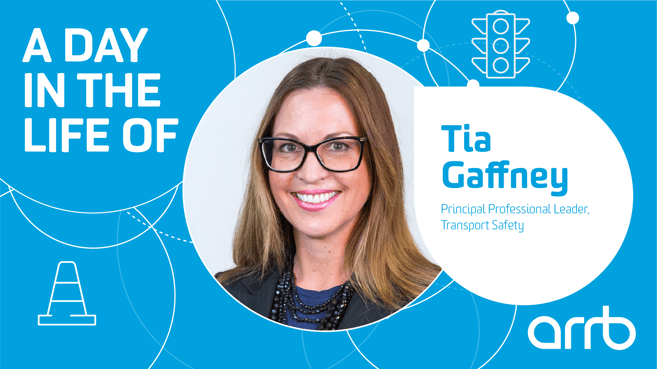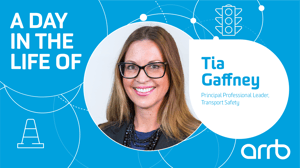This month we're giving you an insight into what life at ARRB is like.
We will be covering the stories of several ARRB employees in the different Strategic Working Groups. First up, we have Tia Gaffney from our Transport Safety team.

What does a day in your life look like?
My husband is a farmer, so he’s up very early. When he leaves, my two girls come and snuggle in bed until we have to get up at 6am.
I'll get the girls ready for school, prepare lunches, and get ready for work.
I drive a Toyota hybrid, do the school dropoff, and take the Monash freeway into the office. I get angry seeing people speed or on their phones. Sometimes I feel like I work 24 hours a day because I am always thinking about improving safety. Even when I’m asleep, I’m thinking about it.
I get to work and walk into our beautiful office in Port Melbourne, saying hello to everyone in our open plan space. Our CEO, Michael Caltabiano can typically be found reading the paper to make sure we are at the forefront of any transport-related news – more often than not, there is something that can be found on the page about safety.
I sit at my desk, coffee in hand and get to work. My day typically entails a lot of meetings with people both nationally and internationally. Some days we have webinars, other days radio or news interviews - every day is different.
Almost every day, we are writing a report about road safety or assisting with road safety policy development. We have a great team with a very broad skillset – from human factors experts, to road design, to environmental sustainability, to vehicle technology and Intelligent Transport Systems. If I have a problem, I can find someone to chat it over with. Collaboration is one of our core values.
After the day’s work is done, it's back on the Monash to drive home.
I’m met with the smiling faces of my family and then its dinner, kids' bath, reading and bed. Of course I sneak my Linkedin time at the end of the day – I love reading what everyone is up to.
And then we go to bed very early!
Why did you decide to become an engineer?
I guess you could say it's in my blood. My family is from Detroit and we are either engineers, scientists or artists. My great grandfather was a civil engineer and so was my grandfather. I find it interesting how engineering is so closely aligned with art. It’s about using your imagination. Initially I became an engineer because I wanted to design things that made people happy and brought people joy. I’m pretty lucky – my first job was for General Motors in Detroit working on the Gen 5 Corvette. Although my family is from Detroit, I grew up in California, near the Silicon Valley. I love the idea that, literally, anything is possible if you have enough passion. I remember when Tesla came out, right near my hometown, people thought the man was crazy. And then we saw Leonardo DiCaprio driving in his Tesla and all of a sudden it was the coolest idea. I wish more celebrities or people in positions of power would take on road safety – we could really use their voices to save lives.
What are your favourite and least favourite parts of your job?
My favourite part of my job is meeting new people who are passionate about road safety and learning something new from them that I didn’t know before. There are road safety advocates and champions everywhere, in lots of different industries. I love having debates about emerging technologies like autonomous vehicles. And, of course, I love knowing that what I do saves lives and prevents trauma. I believe whole heartedly that we will get to zero in my lifetime.
My least favourite part is seeing so much trauma. Sitting in the courtroom and listening to the mom or brother or first responder testify about the things that they saw after a crash is life-altering. After 20 years of investigating crashes, I am starting to see some effects of PTSD and it's something important to talk about. When you dissect a crash down to its most granular detail, you become passionately invested in finding ways it could have been prevented. That’s what we’re trying to do at ARRB, to influence change – even if it is small, gradual change – towards something better. Because no one deserves to die on the road, and no one ever thinks it will happen to them. I’m very disappointed that despite all the COVID lockdowns this year and all the lives saved as a result, we’ve made virtually no dent in saving lives on the road. You can read about it in this report.
Name a career highlight of yours
One of my proudest moments happened last July when I was invited to give evidence to the Joint Select Committee on Road Safety. I would like to sincerely thank our CEO, Michael Caltabiano, and our National Transport Safety leader, David McTiernan, for nominating me to testify on ARRB’s behalf. Being able to discuss important issues like the critical need for road safety in regional Australia and the need for better injury data with members of Parliament, who actually have the power to influence change, was a true honour.
What advice would you give for someone wanting to work in the industry?
- Be passionate, energetic and positive.
- You can’t change the world but you can change your own backyard. Find a niche where you can make a difference (it might be road design, transport planning, law, policing, first response, fire-fighting, research, teaching, automotive engineering, transport and logistics, policy development – there are so many industries that effect road safety!)
- Understanding that the cause of crashes is unequivocally centred in Newton’s Laws – you need to know them as well as your own name. If we reduce speeds, energy, acceleration and forces, we will reduce crashes. It’s really that simple.
- The answer is always in the data. If you know where to find the data, you will be able to find the answer. Without the right data, solving a problem is just a shot in the dark.
- Always look at things holistically. Having a closed mind or taking the stance that people are always to blame for their mistakes is a very limiting viewpoint. A systematic response will always yield a better result to a problem.
Read about the lives of other ARRB staff here:
